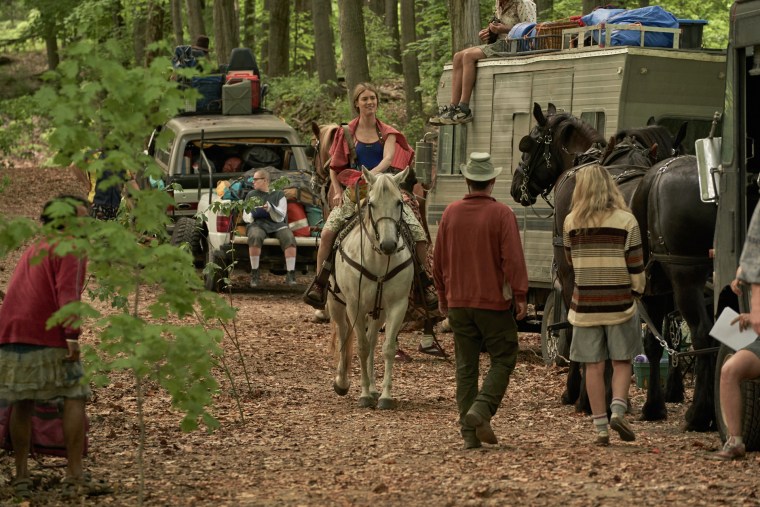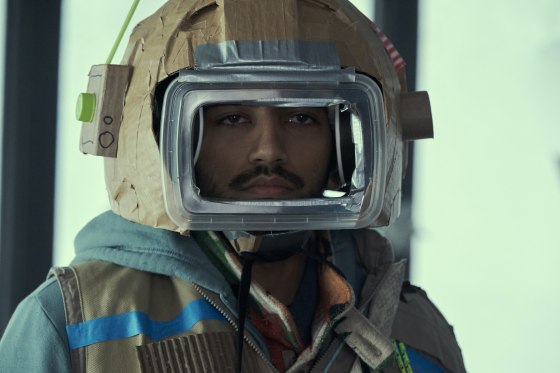It's not lost on showrunner Patrick Somerville that his post-apocalyptic drama "Station Eleven" debuted just as omicron, the latest coronavirus variant, began to race around the globe.
The HBO Max series, based on Emily St. John Mandel's 2014 novel of the same name, follows survivors of a devastating flu as they try to rebuild while coping with what they've lost.
Although the series began filming before the pandemic upended everyone's lives, the parallels are hard to ignore. There are scenes at an overrun hospital, characters who feel anxious when they hear coughing and, of course, the omnipresent feeling of not knowing what's to come.
“Our experience has been very weird since January 2020,” Somerville said. “It’s like Covid’s watching us.”
But "Station Eleven," produced by Paramount Television Studios, isn't like other movies or shows that have similar premises, such as "Contagion." For one thing, the darkness is often softened by moments of warmth and hopefulness.
Jessica Rhoades, an executive producer of "Station Eleven," said that while she isn't generally a fan of the post-apocalyptic genre, she gravitated to the warmth of the series and the book.
And "to the people, to the community and the art,” she said, referring to the theater troupe at the center of the series, which travels around what's left of the U.S. to perform for survivors of the pandemic.
“Those are the things the book and series lean into. Not the fighting for civilization, but what life is,” she said.
But Rhoades said it’s clear that some people prefer “the thrill” that comes with such a premise.
“There’s a science behind the thrill,” she said. "The release of adrenaline from fear of death is very high. Most human beings have stress levels associated with that same fear that evens out the adrenaline being a good feeling but, like for some people, just like a horror film. It’s a high.”
Nate Matteson, another executive producer, said there's a "joy" to the series.
"That intention for joy was there pre-Covid when we were set up to make it," he said. "I think our job as filmmakers and everyone else as cast and crew and also our studio and network partners was to continue to find the joy as we were going."
I think our job ... was to continue to find the joy as we were going.
Nate Matteson, "Station eleven" executive producer
As the world enters what some have called “season three” of pandemic life, Hollywood creatives have had to figure out whether their shows and movies embrace the pandemic or erase it.
“We each cope differently, and each day is different,” said Chrysalis Wright, the director of the Media & Migration Lab at the University of Central Florida. “Maybe one day has been particularly stressful, so escaping is what is needed. Other days, we may need validation for our experiences. Providing a variety of content for consumers will not only help people deal with what happened with them on that day, but also provide a way to help consumers deal with trauma.”
In some shows, like the “Sex and the City” reboot, “And Just Like That …,” the pandemic comes up more subtly, in off-the-cuff comments from main characters.
Carrie Bradshaw (Sarah Jessica Parker) refers to the pandemic, without naming it, the moment she appears onscreen. After a group of patrons brush her aside at a restaurant, Carrie asks, “Remember when we had to legally stand 6 feet apart?”
Meanwhile, in “Grey’s Anatomy,” which takes place in a hospital, the pandemic became central to the season's storyline.
“This pandemic is breaking people, it’s breaking doctors, and we have an opportunity to help drive home the costs to the medical community," showrunner Krista Vernoff told EW about season 17.
Other shows, including Netflix’s “Emily in Paris,” which debuted its second season Thursday, ignore the pandemic's existence.
“Season 1 allowed us an escapism when it came out that it felt it was something that needed to continue — not addressing it because it brings a sense of escapism and joy and laughter in a time that we need it the most,” star Lily Collins told Variety about the show's season two red-carpet premiere.
One approach isn't necessarily better than another, Wright said.
Consumers need to see their experiences onscreen as well as be provided a means of escape, even if it is only for a short time.
Chrysalis Wright, University of Central Florida MEDIA & MIGRATION LAB
“Diversity is what is needed," Wright said. "Regardless of how it is portrayed, consumers need to see their experiences onscreen as well as be provided a means of escape, even if it is only for a short time. Incorporating humor in the mix is needed, as well.”
Hollywood can — and should — include diversity in how it portrays the pandemic, Wright said, such as showing how it affected cities compared to rural and suburban communities and how it played out differently for many Black Americans compared to people of other racial and ethnic backgrounds.
“Covid-19 has taken something away from all of us," Wright said. "There are numerous ways that the pandemic story can be told because of the diversity of experiences. We are all experiencing this together but are on different rides.”
Matteson said we all tend to "look to stories to help organize our own experiences."
"We’ve been doing that forever," he said. "To me, it’s not that surprising that people look to these movies ... or our TV show ... to help them organize what they are experiencing."
Still, the creatives behind "Station Eleven" know not everyone can handle the series right now. And that's OK.

But Somerville said he wants people to know they are "safe watching the show." He described it as fun, even.
"We are making it in a way that is aware of trauma," he said. "We are not telling a story that seeks to exploit pain but tries to help a little bit of healing."
There's a line in episode two in which the conductor of the Traveling Symphony explains what the troupe is trying to accomplish.
"We travel for a reason," the conductor says. "We burn the house down, then go! Just try to make the world make sense for a minute."
Somerville said that's also what the show is trying to do: make sense of everything, if only for a brief period.
"The tragedy of a global pandemic is like a tidal wave," he said. "No story can make that not true. But I think, hopefully, if we do it right ... we make some stories that are shelter a little bit. Until it’s calm again."

